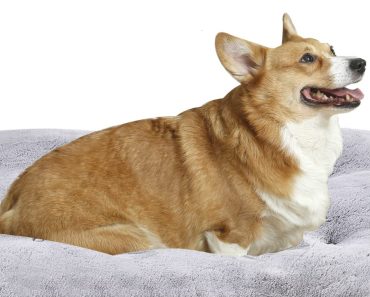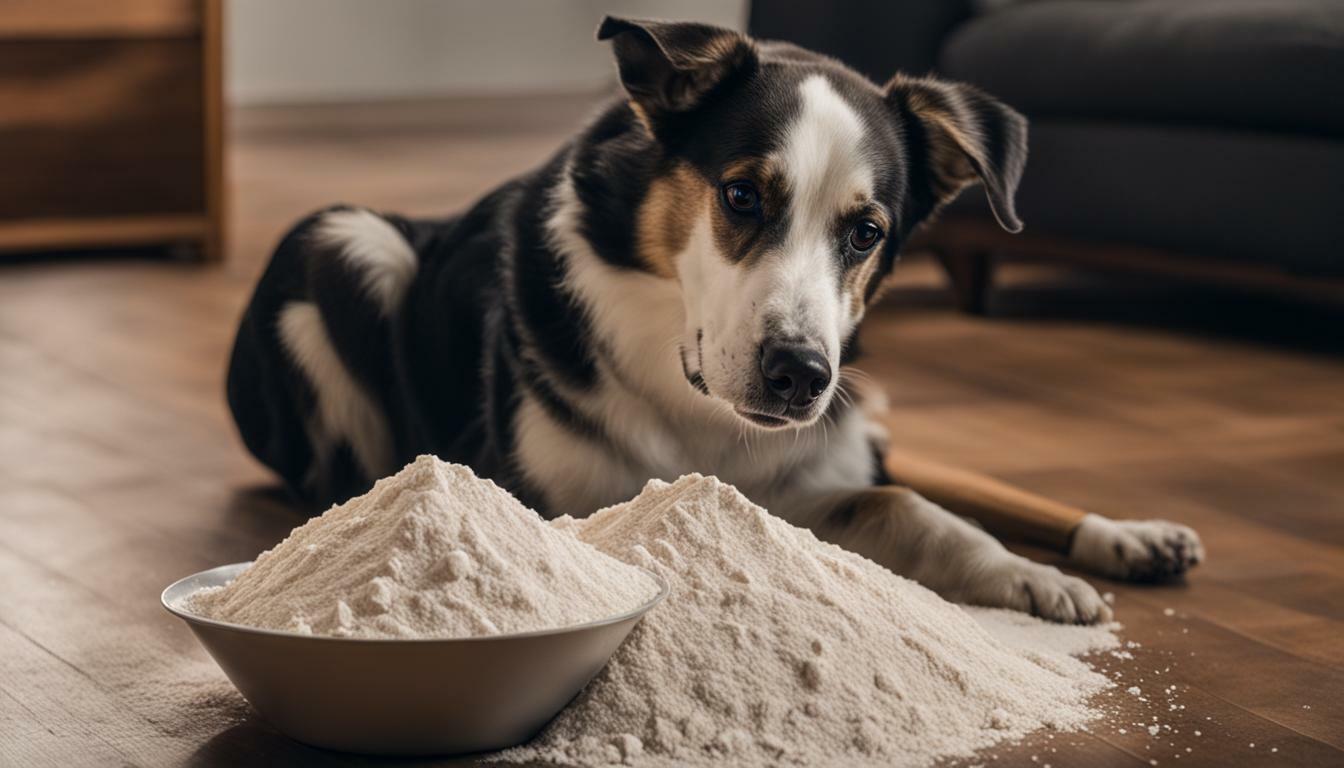
As a dog lover, I have often wondered, can dogs safely consume flour as part of their diet? Flour is a common staple in many human foods, but is it suitable for our furry friends? Today, we’ll explore the truth behind whether dogs can eat flour and its role in their diet.
Key Takeaways:
- Flour can be safe for dogs in small amounts, but it doesn’t provide significant nutritional value.
- Whole-grain flours like barley, buckwheat, oat, quinoa, rice, and sorghum are healthier options for dogs.
- Non-grain flours like almond, chickpea, coconut, hazelnut, lentil, and potato can also be consumed safely.
- Dogs with allergies should avoid flours made from ingredients like soy, wheat, and corn.
- Whole wheat flour is a healthy option for dogs, rich in fiber, protein, vitamins, minerals, and antioxidants.
Now that we have addressed the question of whether dogs can eat flour, let’s dive deeper into the different types of flour that are safe for dogs and the potential benefits they offer. Stay tuned!
Understanding the Different Types of Flour for Dogs
When it comes to flour, it’s important to understand that not all types are created equal, especially if your dog has wheat intolerance or sensitivities. While some types of flour can be safely consumed by dogs, others can cause allergic reactions or digestive issues. As a dog lover and pet owner, I’ve done extensive research to help you navigate the world of flour and make informed choices for your furry friend.
Whole-grain flours such as barley, buckwheat, oat, quinoa, rice, and sorghum are generally considered healthier options for dogs. These flours contain more nutrients and fiber compared to refined white flours. They can be incorporated into homemade dog treats and recipes, providing a wholesome and nutritious addition to your dog’s diet. I personally love using whole-grain flours in my dog’s treats, as they add a delightful texture and flavor.
Non-grain flour alternatives, like almond, chickpea, coconut, hazelnut, lentil, and potato flours, are also safe for dogs. These alternative flours offer unique flavors and textures, which can be a great way to add variety to your dog’s diet. For dogs with specific dietary restrictions, such as a gluten-free diet, coconut flour offers a nutritious option. It is important to note that while these alternative flours are safe for dogs, they should still be introduced gradually and in moderation to ensure your dog’s digestive system adjusts well to the new ingredients.
| Types of Flour | Suitable for Dogs? |
|---|---|
| Barley | Yes |
| Buckwheat | Yes |
| Oat | Yes |
| Quinoa | Yes |
| Rice | Yes |
| Sorghum | Yes |
| Almond | Yes |
| Chickpea | Yes |
| Coconut | Yes |
| Hazelnut | Yes |
| Lentil | Yes |
| Potato | Yes |
| Soy | No |
| Wheat | No |
| Corn | No |
As you explore different types of flour for your dog, always keep in mind their unique dietary needs and any existing allergies or sensitivities. Be sure to consult with your veterinarian before making any significant changes to your dog’s diet. With the right choices and moderation, incorporating flour into your dog’s treats and recipes can be a safe and delightful way to enhance their dining experience.

Healthier Flour Options for Dogs
If you’re looking to add flour to your dog’s diet, there are healthier options to consider. Whole-grain flours like barley, buckwheat, oat, quinoa, rice, and sorghum provide more nutritional value compared to refined or processed flours. These whole-grain flours are rich in fiber, which aids in digestion and promotes a healthy gastrointestinal system in dogs. Additionally, they contain essential vitamins and minerals that contribute to your dog’s overall well-being.
When preparing dog-friendly recipes, using whole-grain flours can be a great way to incorporate a variety of nutrients into your dog’s meals. Whether you’re baking homemade treats or cooking meals from scratch, whole-grain flours offer a nutritious alternative to traditional flour options.
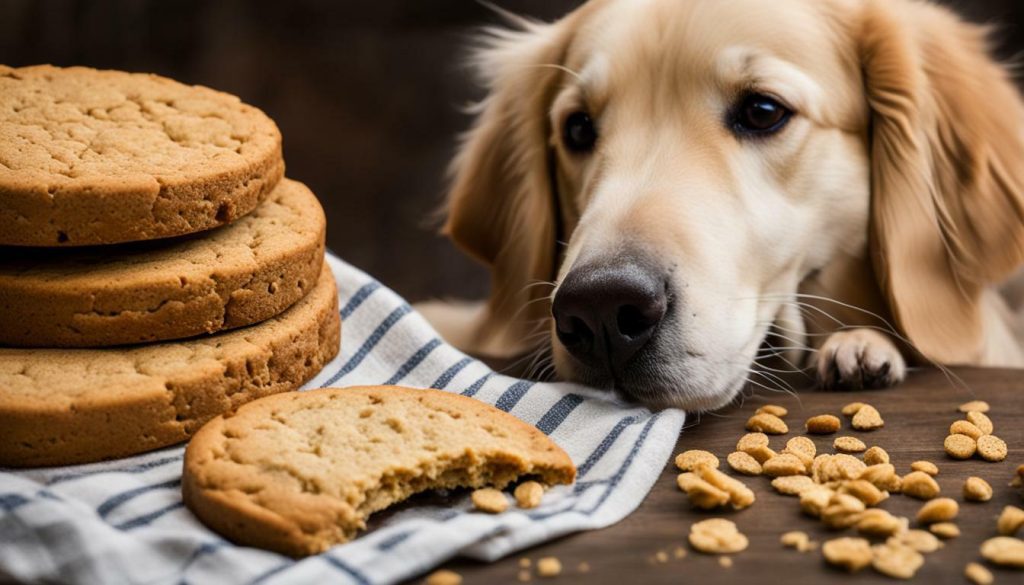
| Whole-Grain Flour | Nutrients |
|---|---|
| Barley Flour | High in fiber, vitamins, and minerals |
| Buckwheat Flour | Rich in protein, fiber, and antioxidants |
| Oat Flour | Good source of fiber, vitamins, and minerals |
| Quinoa Flour | Packed with protein, fiber, and essential amino acids |
| Rice Flour | Easily digestible and gluten-free option |
| Sorghum Flour | Rich in fiber, antioxidants, and minerals |
These whole-grain flours can be used to make a variety of dog-friendly recipes, such as biscuits, muffins, and pancakes. Just make sure to follow proper cooking instructions and avoid adding any harmful ingredients, like chocolate or xylitol.
Experimenting with Healthy Flours
If your furry friend has specific dietary needs or allergies, it’s important to consult with a veterinarian before introducing new flours into their diet. Your vet can provide personalized recommendations based on your dog’s individual needs.
Remember, moderation is key when it comes to adding flour to your dog’s diet. While whole-grain flours offer nutritional benefits, they should still be consumed in appropriate portions. Treats and recipes should complement your dog’s balanced diet and not replace their regular pet food.
By incorporating healthier flour options into your dog’s diet, you can provide them with a variety of nutrients while keeping their taste buds satisfied. Experiment with different whole-grain flours and explore dog-friendly recipes to find the perfect options for your canine companion!
Non-Grain Flour Alternatives for Dogs
For dogs with grain allergies or those on a specialized diet, non-grain flour alternatives can be a great option to explore. These alternatives not only provide variety but also cater to dogs with specific dietary needs. Almond flour, for example, is a popular choice for dogs with grain sensitivities. It is rich in protein and healthy fats, making it a nutritious addition to homemade dog treats and recipes.
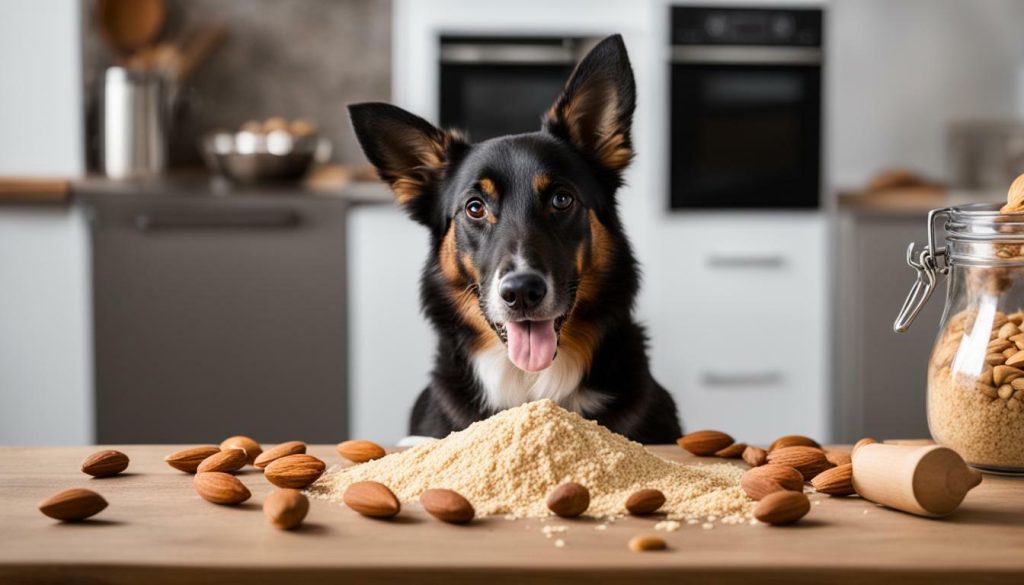
Lentil flour, on the other hand, is a high-fiber option that can benefit dogs with digestive issues. It is also a good source of protein and essential minerals. Lentils are hypoallergenic and low in calories, making them an excellent alternative for dogs with weight concerns or allergies.
When incorporating non-grain flours into your dog’s diet, it is important to start slowly and monitor for any adverse reactions. Each dog is unique, and what works for one may not work for another. It is always recommended to consult with a veterinarian before making any significant changes to your dog’s diet, especially if they have specific health conditions or dietary restrictions.
| Non-Grain Flour | Nutritional Benefits | Recommended for Dogs With |
|---|---|---|
| Almond Flour | High in protein and healthy fats | Grain sensitivities |
| Lentil Flour | Rich in fiber, protein, and essential minerals | Digestive issues, weight concerns, allergies |
Remember, moderation is key when introducing any new ingredient into your dog’s diet. While non-grain flours can be a beneficial addition to their meals, they should always be part of a balanced diet that includes other nutritious dog-friendly ingredients. With the right approach, you can provide your furry friend with a variety of flavors and textures while ensuring their well-being.
The Benefits of Whole Wheat Flour for Dogs
Whole wheat flour can offer several health benefits to dogs, making it a desirable option when cooking for your four-legged friend. It is packed with essential nutrients that can contribute to their overall well-being. Here are some key advantages of incorporating whole wheat flour into your dog’s diet:
- Rich in fiber: Whole wheat flour contains a significant amount of dietary fiber, which aids digestion and helps maintain bowel regularity in dogs.
- Good source of protein: Protein is vital for muscle development and repair, and whole wheat flour provides a decent amount of plant-based protein for dogs.
- Abundant in vitamins and minerals: This type of flour contains essential vitamins and minerals, such as vitamin E, B vitamins, iron, zinc, and magnesium, which support various bodily functions in dogs.
- Antioxidant properties: Whole wheat flour contains antioxidants that help neutralize harmful free radicals and may contribute to a healthier immune system in dogs.
When using whole wheat flour in dog treats and recipes, it is important to remember that moderation is key. While it offers benefits, too much flour in their diet can lead to weight gain and potential health issues. Always consult with your veterinarian to determine the appropriate amount of flour for your individual dog’s needs.
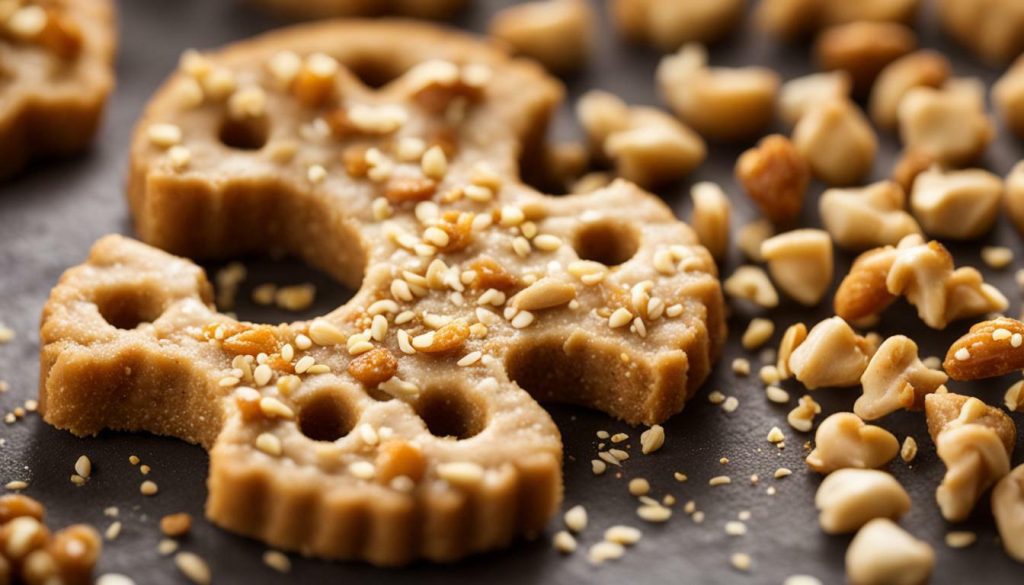
Coconut Flour: A Nutritious Gluten-Free Option for Dogs
If your dog requires a gluten-free diet, coconut flour can be a nutritious alternative to consider in your baking adventures. Not only is it safe for dogs to consume, but it also offers several health benefits.
Coconut flour is made from the flesh of coconuts, which is dried and ground into a fine powder. It is naturally gluten-free, making it a great option for dogs with wheat allergies or gluten intolerance. This versatile flour contains high amounts of fiber, which aids in digestion and promotes a healthy gut. It also provides essential nutrients like protein, healthy fats, and vitamins.
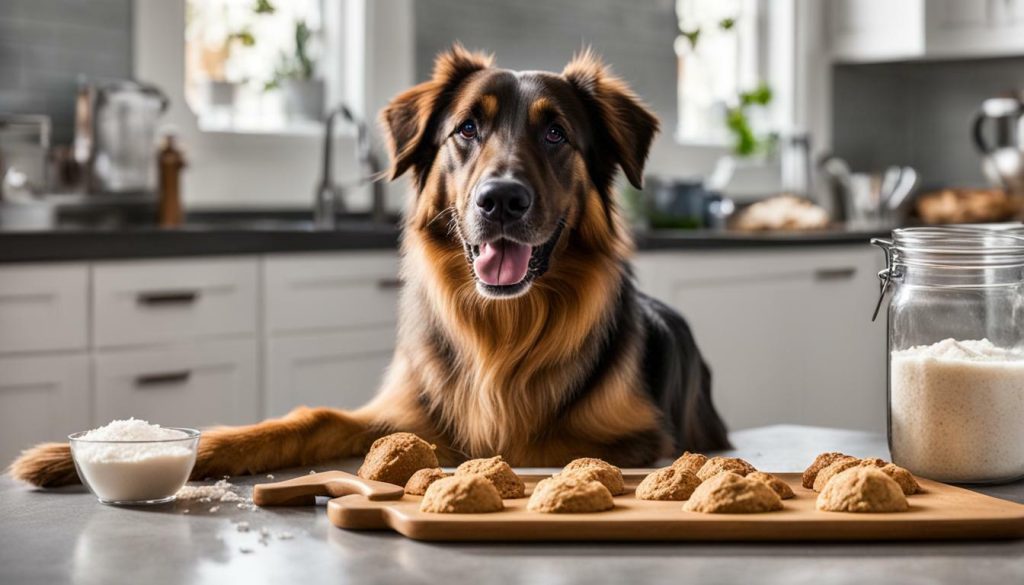
When using coconut flour in dog-friendly recipes, it is important to note that it absorbs more liquid than traditional flours. Therefore, you may need to adjust your recipe by adding more liquids or eggs to achieve the desired consistency. It’s always a good idea to follow a trusted dog-friendly recipe or consult a veterinarian for guidance.
| Benefits of Coconut Flour for Dogs | |
|---|---|
| 1. Gluten-free | Safe for dogs with wheat allergies or gluten intolerance |
| 2. High in Fiber | Aids in digestion and promotes a healthy gut |
| 3. Nutrient-rich | Contains protein, healthy fats, and vitamins |
| 4. Versatile | Can be used in a variety of dog-friendly recipes |
Remember to introduce coconut flour to your dog’s diet gradually, starting with small amounts to ensure they tolerate it well. Monitor your dog for any signs of allergies or digestive issues. As with any new ingredient, it’s always best to consult with a veterinarian before making significant changes to your dog’s diet.
Introducing Flour Safely to Your Dog’s Diet
When it comes to introducing flour to your dog’s diet, it’s crucial to do so gradually and take certain precautions to ensure their safety and well-being. Start by incorporating small amounts of flour into homemade dog treats, closely monitoring your dog’s reaction for any signs of allergies or digestive issues. It’s essential to choose the right type of flour for your furry friend, as some varieties may be harmful to their health.
Table: Types of Flour Safe for Dogs*
| Safe Flour Options | Flour to Avoid |
|---|---|
| Whole-grain flours (barley, buckwheat, oat, quinoa, rice, sorghum) | Wheat flour |
| Non-grain flours (almond, chickpea, coconut, hazelnut, lentil, potato) | Soy flour |
Note: Always consult with your veterinarian before making any changes to your dog’s diet, especially if they have specific dietary requirements or health conditions.
Properly cooking the flour is also essential to eliminate the risk of bacterial infections. When baking dog treats or incorporating flour into recipes, ensure that the flour is cooked thoroughly. Raw flour can contain harmful bacteria, such as E. coli and Salmonella. It’s important to prioritize your dog’s safety by following appropriate cooking and baking guidelines.
Remember, while flour can be used in moderation as an ingredient in homemade dog treats, it should not replace a balanced and nutritious diet specifically formulated for dogs. Always prioritize your dog’s overall health and consult with a veterinarian for personalized dietary recommendations and guidance.

*Consult with your veterinarian to determine the best flour options for your dog based on their specific dietary needs and any existing allergies or intolerances.
Conclusion
While flour can be safe for dogs in moderation, it is essential to prioritize their nutritional needs and consult with a veterinarian for tailored advice. Flour doesn’t provide much nutritional value for dogs, so it is not necessary to add it to their diet. However, if you choose to incorporate flour into your dog’s meals or treats, there are healthier options available.
Whole-grain flours like barley, buckwheat, oat, quinoa, rice, and sorghum are better choices as they offer more nutrients compared to refined flours. These whole-grain flours can provide fiber, protein, vitamins, minerals, and antioxidants that can benefit your furry friend’s overall health.
If you’re looking for non-grain flour alternatives, options like almond, chickpea, coconut, hazelnut, lentil, and potato flours can be safely consumed by dogs. However, it’s important to avoid flours made from ingredients like soy, wheat, and corn that can potentially trigger allergies in some dogs.
When introducing flour into your dog’s diet, it’s crucial to do it gradually and in small amounts to monitor for any allergic reactions. Additionally, ensure that the flour is properly cooked to avoid bacterial infections. If your dog is overweight or has specific dietary requirements such as wheat allergies or gluten intolerance, exercise caution when incorporating flour into their meals or treats.
Remember, every dog is unique, and their nutritional needs may vary. Consulting with a veterinarian is always the best way to ensure the well-being and health of your furry companion. They can provide personalized dietary recommendations based on your dog’s specific requirements, ensuring they receive the appropriate nutrition for a long and happy life.
FAQ
Can dogs eat flour?
Yes, dogs can eat flour in small amounts, but it should not be a significant part of their diet.
What types of flour are safe for dogs?
Whole-grain flours like barley, buckwheat, oat, quinoa, rice, and sorghum are healthier options for dogs. Non-grain flours like almond, chickpea, coconut, hazelnut, lentil, and potato can also be consumed safely.
Are there any flours dogs should avoid?
Dogs should avoid flours made from ingredients like soy, wheat, and corn, as these can lead to allergies. It is important to be cautious if your dog is overweight or has wheat allergies or gluten intolerance.
How should I introduce flour to my dog’s diet?
It is important to introduce flour slowly and in small quantities to avoid allergic reactions. Make sure the flour is properly cooked to avoid bacterial infections. Consult with a veterinarian for dietary recommendations specific to your dog’s needs.






